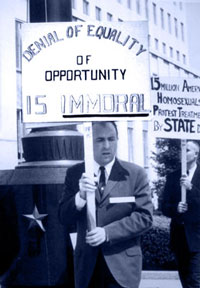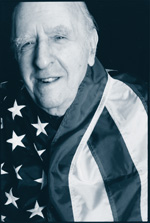 Frank Kameny
Frank Kameny
Gay Pioneer
b. May 21, 1925
d. October 11, 2011
Read the Frank Kameny Tribute delivered at the National LGBT 50th Ceremony.
FRANK KAMENY was the chief strategist and the father of the LGBT civil rights movement. The nonviolence of black civil rights organizers Bayard Rustin and the Rev. Dr. Martin Luther King Jr. influenced his methods.
A World War II veteran with a Ph.D. from Harvard University, Kameny worked as an astronomer for the Army Map Service. In 1957 he was fired for being gay. By executive order of President Eisenhower in 1953, gays and lesbians were prohibited from serving as federal employees.
Kameny’s termination fueled a lifetime of activism. He fought his dismissal in the federal courts and in 1961 filed the first gay rights appeal to the U.S. Supreme Court. The same year, Kameny cofounded the Mattachine Society of Washington, D.C., with Jack Nichols. The Mattachine Societies of New York and Washington became the first gay civil liberties organizations in the United States. Later, Kameny helped start organizations that would become the National LGBTQ Task Force and the Human Rights Campaign.
Kameny, along with Craig Rodwell, took the lead in organizing the Annual Reminders—the first public demonstrations for gay equality. Held each Fourth of July from 1965 to 1969 in front of Independence Hall (which then housed the Liberty Bell), the protests paved the way for the Stonewall riot in 1969. Kameny and fellow Gay Pioneer Barbara Gittings enlisted activists from New York, Washington, D.C., and Philadelphia to participate. At the first Annual Reminder, 40 brave gay and lesbian picketers carried signs demanding equality. By 1969 their numbers had more than tripled. Inspired by Stokely Carmichael’s “Black Is Beautiful,” Kameny coined the movement’s slogan, “Gay Is Good,” during this period.
“The momentum is there, and that’s not going to be stopped. It’s moved from hopes of a grassroots movement to the actuality of a grassroots movement.”
|
After 1969, Kameny, Gittings and others suspended the Annual Reminders to marshal support for a 1970 march commemorating the first anniversary of Stonewall. Proceeding from Greenwich Village to Central Park, it is remembered as the first New York City Pride Parade.
With Gittings, Kameny waged a multi-year campaign against the American Psychiatric Association (APA) for its classification of homosexuality as a mental illness. In 1970 Kameny led members of the Gay Liberation Front and Gay Activists Alliance in a demonstration at the annual meeting of the APA. The next year, Kameny, Gittings and fellow agitators stormed the meeting and Kameny seized the microphone, demanding to be heard. For the APA’s annual meeting in 1972, Kameny and Gittings organized a panel on homosexuality. When no gay psychiatrist would openly serve on it for fear of professional repercussions, Gittings recruited Dr. H. Anonymous (John E. Fryer, M.D.), who appeared masked and using a voice modulator. The three of them asserted that the disease was not homosexuality, but toxic homophobia. Consequently, the APA formed a committee to determine whether there was scientific evidence to support its conclusion.
In 1973, with Kameny and Gittings present by invitation, the APA announced the declassification of homosexuality as a mental illness. Kameny described it as the day “we were cured en masse by the psychiatrists.” At the time, the “cures” for homosexuality included electric shock therapy, institutionalization and lobotomy. With the APA's decision, the gay rights movement was no longer encumbered by the label of mental illness and its consequences.
In 1975 the US Civil Service Commission lifted its ban on gay employees, a victory Kameny pursued relentlessly for nearly two decades. Two years later, he became the first openly gay candidate to run for Congress.
Kameny appeared in “Gay Pioneers,” a documentary co-produced by WHYY/PBS and Equality Forum about the Annual Reminders. In 2007 the Washington City Council honored him as a “true freedom fighter,” and in 2009 he received a formal apology for his dismissal from the Army Map Service.

Kameny was invited to witness the signing of the Don't Ask, Don't Tell Repeal Act, and President Obama lauded him for his seminal efforts. As far back as the 1970s, Kameny was chipping away at the ban on gays in the military. He counseled countless potential gay inductees, closeted service members, and gay military facing discharge for their sexual orientation, and assisted scores of gays encountering problems getting or keeping security clearances.
The Library of Congress has incorporated more than 70,000 letters, documents and memorabilia from Frank Kameny’s vast personal archives into its permanent collection. A dozen of his handmade picket signs reside in the National Museum of American History of the Smithsonian Institution. Kameny’s Washington, D.C., home is listed on the National Register of Historic Places.
“Gay Is Good: The Life and Letters of Gay Rights Pioneer Franklin Kameny” (2015), edited by Michael G. Long, showcases a selection of Kameny’s searing missives, which took to task politicians, pundits, journalists and other high-profile figures.
Frank Kameny was celebrated during LGBT History Month in 2014. For more information, visit lgbthistorymonth.com/frank-kameny.






